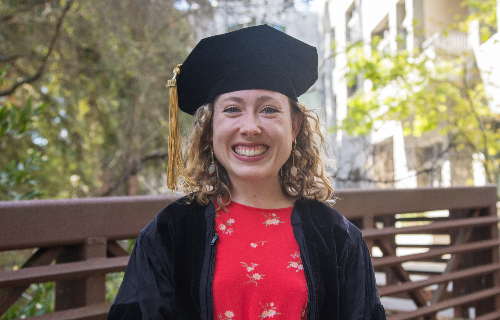Campus News
Amanda Quirk
Amanda Quirk’s research on galaxy mergers showed evidence that the Andromeda galaxy had some kind of major galactic collision in the past 4 billion years, and survived—which has implications for our own galaxy, the Milky Way.

The 27-year-old from Alpharetta, Ga., who completed her doctoral studies in astronomy and astrophysics at UC Santa Cruz this year, has spent the last five years studying something called galactic cannibalism or galaxy mergers, which is what happens when two galaxies collide.
Sometimes, when the crash involves spiral galaxies like those Quirk studied, one of these beautiful but fragile star systems will be torn to shreds. Other times, one of the galaxies will swallow the other. Peering deep into space using one of the world’s largest telescopes, Quirk measured the difference between how fast old and new stars moved in two relatively nearby galaxies, Andromeda and the smaller Triangulum. Differences in the velocity of these old and new stars are an indication of changes the galaxy may have undergone. Quirk’s research showed evidence that Andromeda had some kind of major galactic collision in the past 4 billion years. And, most importantly, survived.
“Just seeing that it is perhaps possible for Andromeda to survive a merger tells us, in general, about the kinds of mergers spiral galaxies might be able to endure,” said Quirk, who received a prestigious National Science Foundation grad research grant to support her work.
All of which has implications for our own galaxy, the Milky Way, which is on a collision course with the Andromeda galaxy billions of years from now.
With three papers already published in respected journals, Quirk will now head to Columbia University for a postdoc position teaching science—a calling evidenced by her first-place finish in this year’s UCSC Grad Slam competition followed by her second-place finish in the wider UC Grad Slam, in which researchers must explain the entirety of their work in a three-minute elevator pitch any layperson can understand.
That ability to explain difficult concepts in exciting and easy-to-understand ways was enhanced, according to Quirk, through the campus’s Center for Innovation in Teaching and Learning. In addition, she was able to put those same skills to use by being a mentor in a course titled Introduction to Research (AY9) in the Astronomy Department. The two-quarter class was designed to help first-year and transfer students learn the fundamentals of research, from how to code to how to read and write research papers. She also mentored high school students interested in astronomy as part of UC Santa Cruz’s eight-week Science Internship Program.
“To interact with undergrad and high school students who cared about science and astronomy and were excited about it, was wonderful,” she said.
Quirk also formed a support group for disabled grad students while serving as a grad student assistant in the Disability Resource Center on campus. While the pandemic quashed the program after a short time, it “was cathartic to hear I wasn’t alone,” Quirk said.
“Amanda is a brilliant scientist, creative thinker, passionate mentor, and articulate communicator,” said Professor Raja GuhaThakurta, chair of the Department of Astronomy and Astrophysics. “I have learned a tremendous amount from her spirit of perseverance against odds, tremendous empathy, and a desire to make the world a better place.”
Quirk, meanwhile, will continue to explore galaxies, driven by her quest for knowledge and the chance to see our own place, not only in the world but in the universe.
“Seeing how small each individual human is in the universe reminds me to be more patient, to not sweat the small stuff or things that are out of my control,” Quirk said. “Space exists beyond us and it will exist after us, and I find that knowledge kind of freeing. It gives me peace.”